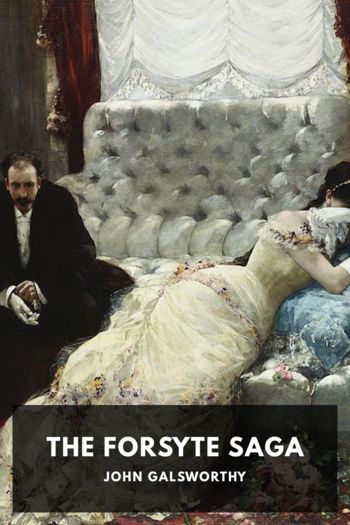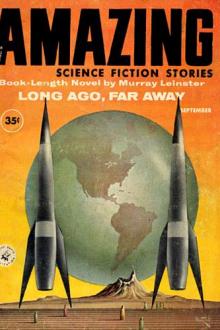The Forsyte Saga - John Galsworthy (best english novels for beginners .txt) 📗

- Author: John Galsworthy
Book online «The Forsyte Saga - John Galsworthy (best english novels for beginners .txt) 📗». Author John Galsworthy
On reaching home Fleur found an atmosphere so peculiar that it penetrated even the perplexed aura of her own private life. Her mother was inaccessibly entrenched in a brown study; her father contemplating fate in the vinery. Neither of them had a word to throw to a dog. “Is it because of me?” thought Fleur. “Or because of Profond?” To her mother she said:
“What’s the matter with Father?”
Her mother answered with a shrug of her shoulders.
To her father:
“What’s the matter with Mother?”
Her father answered:
“Matter? What should be the matter?” and gave her a sharp look.
“By the way,” murmured Fleur, “Monsieur Profond is going a ‘small’ voyage on his yacht, to the South Seas.”
Soames examined a branch on which no grapes were growing.
“This vine’s a failure,” he said. “I’ve had young Mont here. He asked me something about you.”
“Oh! How do you like him, Father?”
“He—he’s a product—like all these young people.”
“What were you at his age, dear?”
Soames smiled grimly.
“We went to work, and didn’t play about—flying and motoring, and making love.”
“Didn’t you ever make love?”
She avoided looking at him while she said that, but she saw him well enough. His pale face had reddened, his eyebrows, where darkness was still mingled with the grey, had come close together.
“I had no time or inclination to philander.”
“Perhaps you had a grand passion.”
Soames looked at her intently.
“Yes—if you want to know—and much good it did me.” He moved away, along by the hot-water pipes. Fleur tiptoed silently after him.
“Tell me about it, Father!”
Soames became very still.
“What should you want to know about such things, at your age?”
“Is she alive?”
He nodded.
“And married?”
“Yes.”
“It’s Jon Forsyte’s mother, isn’t it? And she was your wife first.”
It was said in a flash of intuition. Surely his opposition came from his anxiety that she should not know of that old wound to his pride. But she was startled. To see someone so old and calm wince as if struck, to hear so sharp a note of pain in his voice!
“Who told you that? If your aunt! I can’t bear the affair talked of.”
“But, darling,” said Fleur, softly, “it’s so long ago.”
“Long ago or not, I. …”
Fleur stood stroking his arm.
“I’ve tried to forget,” he said suddenly; “I don’t wish to be reminded.” And then, as if venting some long and secret irritation, he added: “In these days people don’t understand. Grand passion, indeed! No one knows what it is.”
“I do,” said Fleur, almost in a whisper.
Soames, who had turned his back on her, spun round.
“What are you talking of—a child like you!”
“Perhaps I’ve inherited it, Father.”
“What?”
“For her son, you see.”
He was pale as a sheet, and she knew that she was as bad. They stood staring at each other in the steamy heat, redolent of the mushy scent of earth, of potted geranium, and of vines coming along fast.
“This is crazy,” said Soames at last, between dry lips.
Scarcely moving her own, she murmured:
“Don’t be angry, Father. I can’t help it.”
But she could see he wasn’t angry; only scared, deeply scared.
“I thought that foolishness,” he stammered, “was all forgotten.”
“Oh, no! It’s ten times what it was.”
Soames kicked at the hot-water pipe. The hapless movement touched her, who had no fear of her father—none.
“Dearest!” she said. “What must be, must, you know.”
“Must!” repeated Soames. “You don’t know what you’re talking of. Has that boy been told?”
The blood rushed into her cheeks.
“Not yet.”
He had turned from her again, and, with one shoulder a little raised, stood staring fixedly at a joint in the pipes.
“It’s most distasteful to me,” he said suddenly; “nothing could be more so. Son of that fellow! It’s—it’s—perverse!”
She had noted, almost unconsciously, that he did not say “son of that woman,” and again her intuition began working.
Did the ghost of that grand passion linger in some corner of his heart?
She slipped her hand under his arm.
“Jon’s father is quite ill and old; I saw him.”
“You—?”
“Yes, I went there with Jon; I saw them both.”
“Well, and what did they say to you?”
“Nothing. They were very polite.”
“They would be.” He resumed his contemplation of the pipe-joint, and then said suddenly:
“I must think this over—I’ll speak to you again tonight.”
She knew this was final for the moment, and stole away, leaving him still looking at the pipe-joint. She wandered into the fruit-garden, among the raspberry and currant bushes, without impetus to pick and eat. Two months ago—she was lighthearted! Even two days ago—lighthearted, before Prosper Profond told her. Now she felt tangled in a web—of passions, vested rights, oppressions and revolts, the ties of love and hate. At this dark moment of discouragement there seemed, even to her holdfast nature, no way out. How deal with it—how sway and bend things to her will, and get her heart’s desire? And, suddenly, round the corner of the high box hedge, she came plump on her mother, walking swiftly, with an open letter in her hand. Her bosom was heaving, her eyes dilated, her cheeks flushed. Instantly Fleur thought: “The yacht! Poor Mother!”
Annette gave her a wide startled look, and said:
“J’ai la migraine.”
“I’m awfully sorry, Mother.”
“Oh, yes! you and your father—sorry!”
“But, Mother—I am. I know what it feels like.”
Annette’s startled eyes grew wide, till the whites showed above them.
“Poor innocent!” she said.
Her mother—so self-possessed, and commonsensical—to look and speak like this! It was all frightening! Her father, her mother, herself! And only two months back they had seemed to have everything they wanted in this world.
Annette crumpled the letter in her hand. Fleur knew that she must ignore the sight.
“Can’t I do anything for your head, Mother?”
Annette shook that head and walked on, swaying





Comments (0)